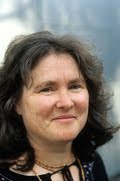It's weird how I often read several books in a row that have a similar theme. Last week I finished a book about saving an island from development (
Kaitangata Twitch). This week I picked up
Green Boy by Susan Cooper thinking it would be another action-packed children's story set in the British Isles and maybe have something more to do with the old myths and legends of Merlin's time. If you haven't read
The Dark is Rising sequence then that's what those books are about and I recommend them highly.
I was happily surprised though to discover that Green Boy was a Carribean island story about Trey and her little brother Lou who is mute but very special. And guess what! They are trying to save their beloved Long Pond Cay from development.
But that's where the similarities end because the children are somehow transported to another world in the future where development has taken over and not a single untouched forest remains. There are wilderness areas though, filled with dangerous mutant creatures and a ragtag bunch of protesters who are desperate to find Lou ahead of the ruling Government forces.
Green Boy is an enjoyable read probably suitable for senior Primary School level. I liked Cooper's description of the beaches and the boats and the terror of the hurricane that hits Trey's village. Trey's relationship with her father is also handled well. I got a real sense of who Trey was and where her loyalties lay. If you enjoy speculative fiction then give this novel a try.



